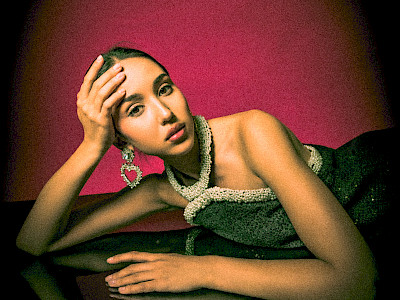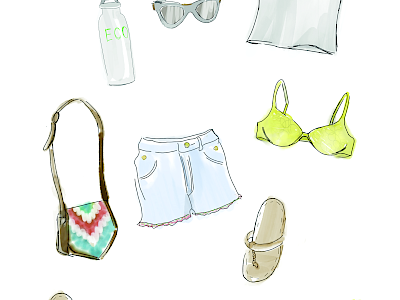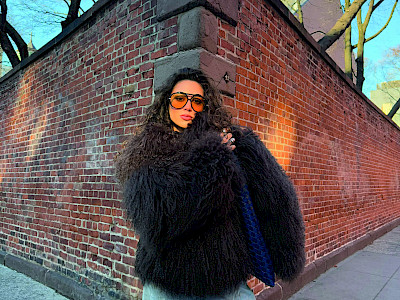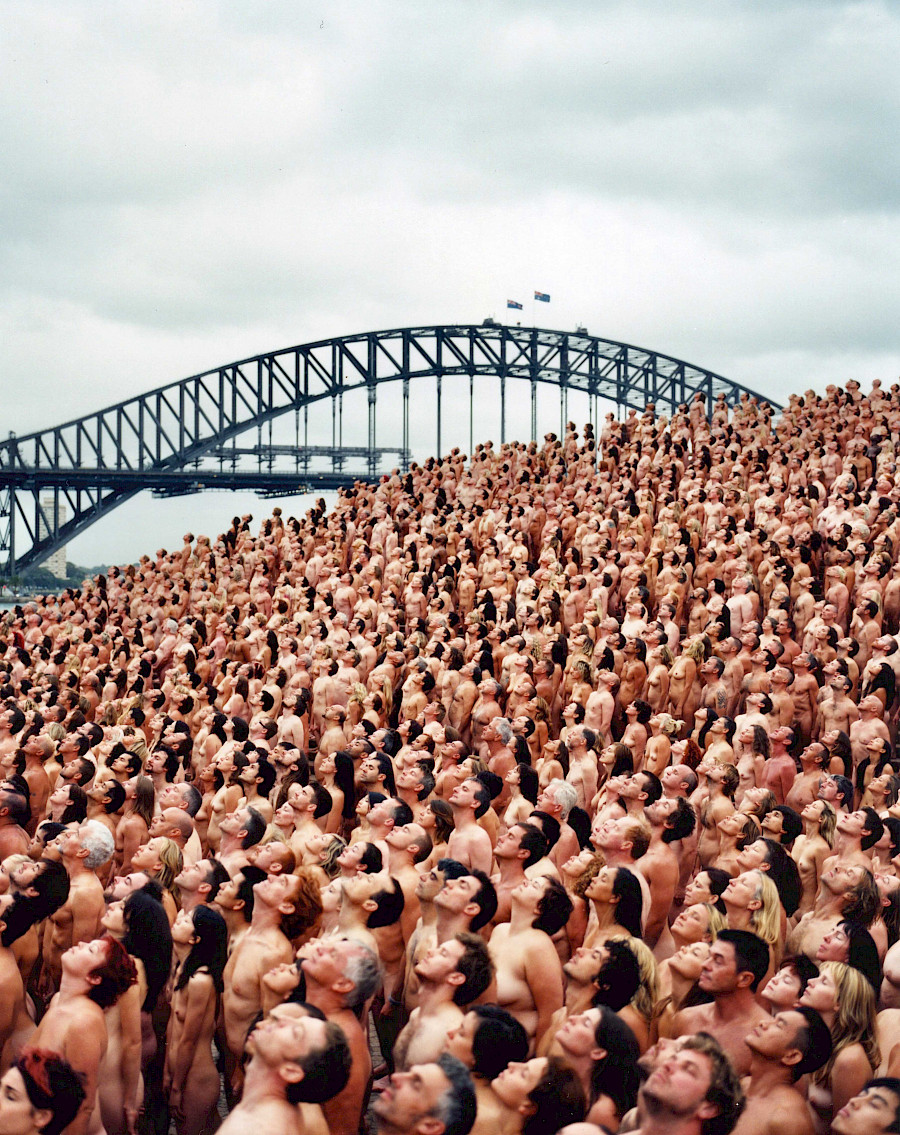
Perhaps each of us at least once had a nightmare when you find yourself in a public place naked and wake up in a cold sweat from an unbearable sense of shame. It must be said that the phenomenon of shame for the first time reveals itself in human existence. In his work "Shame and the Origins of Self-Esteem" Jungian analyst notes that for human beings it is "unnatural to behave naturally towards their physical being". But the collective shamelessness in the almost dreamlike work of the iconic American photographer Spencer Tuniсk is built on the opposite – the idea of the “organicness” of naked bodies and the inconsistency of the urban background. His works are an artistic act that combines performance, sculpture and photography. In total, over his entire life he undressed and laid down on the pavements almost 50 thousand people. Among the models were also students, as well as respectable fathers, employees, teachers, retirees – all believing that there is still love, beauty and synchronized undisguised heartbeats in the world. From the outside, filming of his installation reminds the demarche of cult members: thousands of naked people, by orders of one person with a megaphone, create on the landscape a composition from their own bodies. New York, Vienna, Los Angeles, Basel, Mexico City, Barcelona, Amsterdam, Sydney – hordes of naked people transformed these cities for a couple of hours into symbiosis of urbanism and living flesh.
It's probably an overwhelmingly sweet feeling when the energy of a thousand naked bodies is subjected to your will...
I like to create art, I like it when a photo takes a physical form, fits in a frame, then is placed somewhere – for example, on a wall at someone's house or in a gallery. It pleases me as an artist. It's not enough for me just to have a digital version of the photo somewhere on smartphone, tablet or computer – I don't feel like my job is done here. For me, the result of the finished work is a physical object that can be picked up, which will leave a mark in life – this satisfies me most of all. I always try to be open to communication as much as possible. You know, when you work with so many people, it's hard to achieve, but I try to stay in touch with people. At least I'm trying. And I have a magic camera that "shoots" a rainbow into the crowd, making them undress.
In the Abrahamic tradition, nudity is taboo, as well as sex and other joys of the flesh. But the mass character of nudity in your works muffles the erotic sounding of nudity. Does the naked crowd itself demonstrate erotic attitude?
People involved in these scenes do not think about sex at all, they sincerely intend to create art. By posing, people understand how equal we really are and that clothing is our armor. All the people posing for me are not nudists at all and do this for the first time. These are ordinary people who want to try something for once, they may never do it again. They are often shy at first, but when a thousand people around are naked, some dressed people start to feel uncomfortable about not being naked.
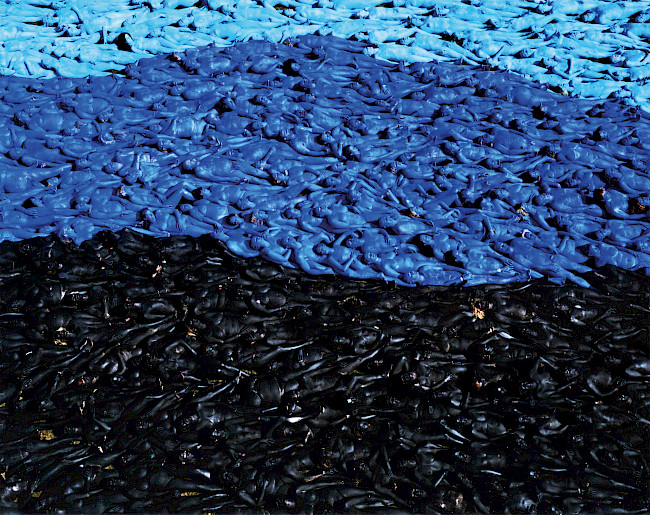
Mass nudity gives the impression of impersonation. People pose together because together is not embarrassing?
No, I think that any collective feeling can be perceived in different ways. One group of people may feel ashamed, while the other group will feel relaxed. It all depends on the person himself, on what policies are pursued in his country or state, what values and tendencies it conveys. In New York State, there is a law that protects a person's body photographed in a public place as an art object. Therefore, in New York State, you can pose naked in any locality during photo or video shooting. But the laws are different. In some states, for example, it is forbidden to put up a chaise longue by house and lie naked on it, sipping a cocktail. But during the shooting this is allowed: if you use a location with a chaise longue and a cocktail at home in order to shoot some piece, then go ahead!.. In general, I must say, this is a very powerful feeling – when you lie on concrete or on the asphalt of the sidewalk naked. This creates a sense of connection with nature, with progress, with the "concrete jungle"... Some kind of unity of opposites.
Who is more shy about being naked: men or women?
In some countries, men suppress the free spirit of women. But in general, when I do photographic work, the ratio is almost always the same: 55% of wishing to participate are men, 45% are women.
Your works were called "act of prostitution in the guise of art" by officials in Israel. You're not affected by that reaction? Was there a response "message" on your part?
This mostly hurts the feelings of those citizens who want to participate in the shooting. What we do is a collective work. Imagine a thousand people expressed a desire to be on my set, but they are censored, their desire is not respected, they are not allowed to become a part of an artwork. Thus, the citizens of this country suffer from this more, and only then suffers my desire to create and generally be in this area. The conservative part of the government wanted to suspend my work, but in the end love and art won and I managed to peacefully complete work on the Dead Sea. These conservatives, probably, dreamed naked people afterwards, floating over them, waving and smiling at them.
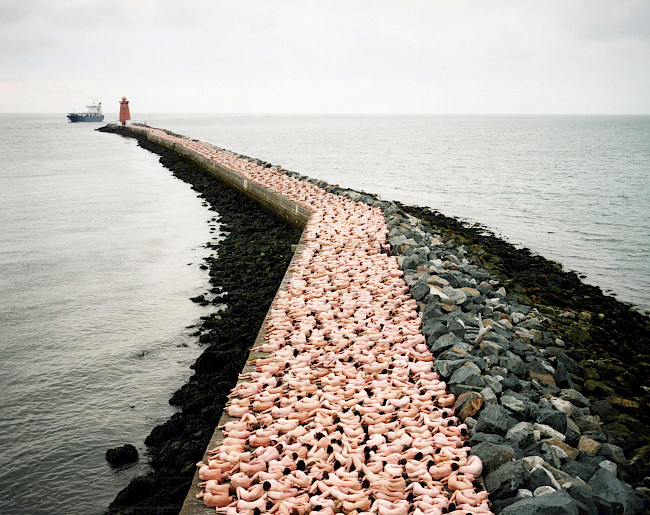
What, in general, do you think can be called art, and what can't?
If you call yourself an artist, you're an artist. Artists cannot control what feelings their works cause in others. Everything that claims to be art, actually is, good or bad. But it's not for the artist to decide. The decision is always for the arbitrators: they are educated, they have some knowledge – and they decide. That's the hierarchy. There is no democracy, that's how the world of art works.
So this means that the artist still needs professional education?
Getting education in arts is not bad if there is such an opportunity. If you want to create and survive in a competitive art environment, education will be a good help. Because you are trying to promote new ideas, and doing this without any basis, without experience and mentors is hard. In the competitive art world, the strongest survives, and keeping afloat is not an easy task, because the competition here is wild. Therefore, the more educated a person is, the more he studied, the better.
So can I call myself an artist if I don't have a needed education?
You can. It is not enough to call yourself an artist: you need to show some theoretical or practical work to prove this. Explain your vision. And if the viewer likes it, then great. In this case not the artist decides, but the viewer.
After your performance in Chile, when instead of the planned four hundred people, almost three thousand came to set, who happily ran home naked afterwards, and you were announced Man of the Year, can we talk about the psychotherapeutic impact of your art?
Yes, often my performances have a certain therapeutic effect. People feel that they are masters of their bodies, and become less uptight, free. The feeling of awkwardness disappears – because they pose, and this helps. And it doesn't matter what your body type is, whether you are small or tall, skinny or chubby. People gain confidence in themselves, free themselves from a ridiculous sense of embarrassment, they are no longer ashamed to demonstrate their body. I like my job because I work with people, I see their reaction. This is not the case for artists working, for example, with clay or paint. My work is about emotions and feelings, and I like that people open up with me and become stronger internally. It is always great to work in an environment where there are human emotions and human legs... – to move.
When society is oppressed, my works take a new meaning: people pose not only for art, they thereby shout to the government that they cannot be owned and that they are free to act with their bodies as they want. Of course, there are limitations. But just standing or lying naked next to each other is not sexy, and a person should have the right to independently dispose of his body, including creating art with it, creating forms and abstractions in the public space within a certain place and time. For example, in Chile, ten years before my arrival, was a dictatorship. When I came to this country to create my own art, I believed that the trip would be short, but I had to stay longer, since thousands volunteered to pose – my project became a bloodless way for them to express to the government their extreme concern.
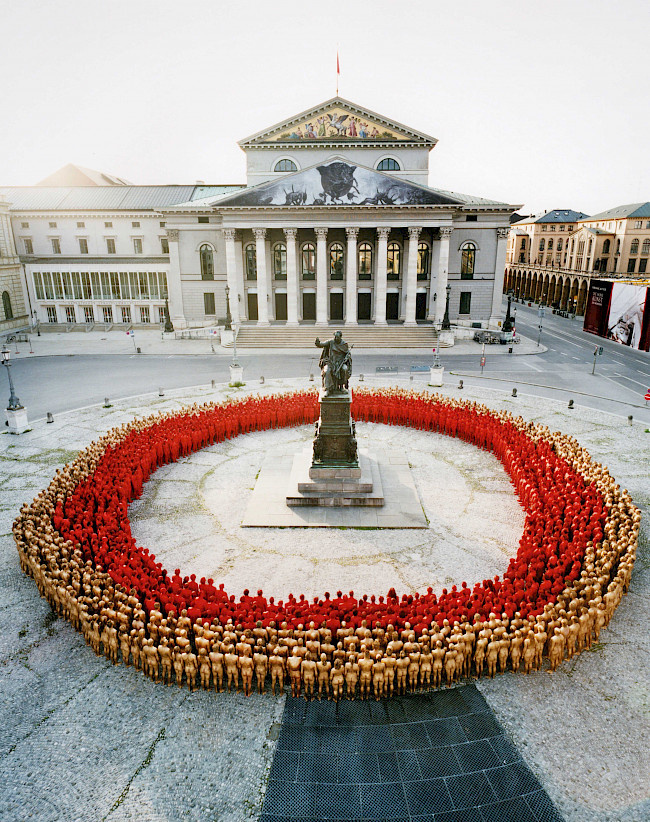
You once said that the attitude to nudity is a barometer of freedom in society. Do you prefer to do your projects in places of "greatest resistance" or only in those countries where people are ready to perceive your art?
In conservative countries, my work is more significant for those who pose, and this allows me to feel that I have changed something on this planet for my short stay on it. Whatever you say, there is something special about it – making people free with the help of art and naked bodies in the streets...
What do you think reflects the willingness of people to undress in front of thousands of other strangers?
About their brilliance and artistic mission of the project.
How have the models changed over the three decades of your work? Are today's naked people different from the 1991 or is there no difference?
More tattoos. In the past, tattoos were more of a bohemian phenomenon, now they have become a trend, even conservative people have them.
When I first began taking pictures of naked people, the only place to see the captured nude was museums and photography book stores. And today, with the rise of the Internet, Facebook and Instagram, all photographers and their mothers (Shh!) take nude style photos in public places. Everyone does it. If you open the portfolio of almost any photographer, you will see that for the good half of his creative period he took such pictures in city locations, in public places. This is part of our world view as artists. Maybe we used to be less before. And now we're not, and even people who are not photographers pose naked. The world became more willing to undress. Everyone has cameras, as well as a growing sense of rebellion, a desire to oppose the government, religious or moral restrictions. Therefore, I believe that today is a very favorable time for human nudity.
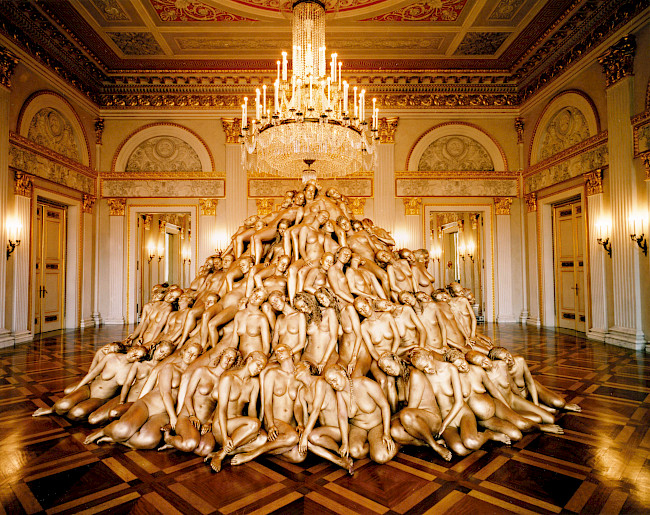
If you imagine for a minute that nudity has become commonplace, has stopped to be taboo, has lost its fleur of scandalous, would you continue to shoot nudes?
If nudity became commonplace, there would be less wars and less violence against women, since the body would be slightly desexualized. Yeah, I'd keep doing it.
Is the scandalousness of your art a goal or an accompanying circumstance?
I concentrate on creating the objects of art themselves, and other people create stories around them that help me in my ideas.
You did protests against censoring nudity on Instagram. Were you able to achieve something?
Instagram is a chronicle of today's world, good or bad. Nudity in photography should be permissible on a social media platform, as I understand it, without allowing pornography. And Instagram should give freedom in art. We, The Nipple, caused a slight commotion in the head offices of both Instagram and Facebook, inviting each responsible manager to look at the reflection of his naked body in the mirror and decide for themselves whether it is violence or crime. Instagram allows to post nudity if it is sculpture or painting, even erotic stories in which people, for example, have sex. These are not banned. But content in which there is a naked body shot on a video or camera is immediately blocked. It turns out that Instagram censors art. In YouTube you can place nudity as art, that is, they found a way out so that a naked body as art can exist on their platform.
My works wouldn't be banned on YouTube. But why can't I do it on Instagram? Why don't they want to make an exception for nude artists? I don't think they're doing the right thing. If someone wants to advertise that an exhibition is taking place in the city, or positions himself as an artist, you can create a function with which such people can get permission to publish. After all, they do not work with a naked body in the field of pornography. Although there's nothing wrong with sex, it's fine. You could create a service that allows you to separate pornography from a captured naked body. That is why I initiated a campaign to draw attention to this problem. And it was relatively successful.
What did you achieve as a result?
I got a meeting where other artists and museum directors gathered, and we discussed this issue. But then the pandemic began, and therefore those changes that could well have happened, meaning, the creation of a verification and admission system for artists, are now in limbo.
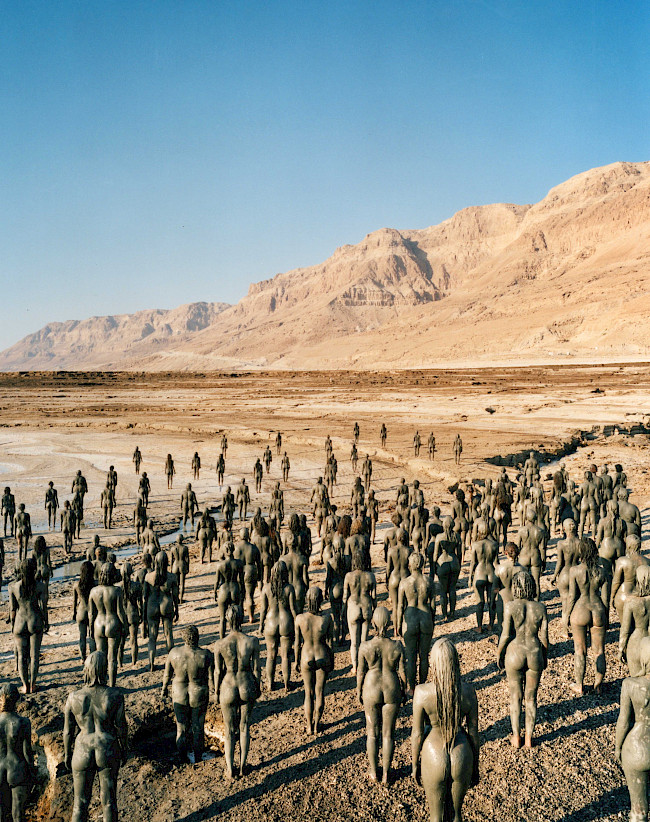
Many of your actions are dedicated to environmental problems that arose due to human fault. Where do you think the border between man and nature runs? Can mankind exist without destroying nature?
People should plant more trees, and then dance naked around them. People in their lives need more access to art, color, public art. If the country becomes kinder to its artists, they will be kinder to the planet and nature. Together with scientists and environmental advocates, artists will save society from suffering from narcissism, lazy, blinded by power, corrupt officials.
When I shoot a group of people in nature, I always have the feeling that it is not just a person, but a particle of the city that invaded nature.
For me, the human body is inseparably connected with urbanism, the city environment. I do not see this as a tandem nature – nature: in my understanding, human is not nature, it is the architecture of the city, dressed in flesh and located on its, nature's, territory. We began to move away from nature, and I do not think that we still maintain the privilege of being called nature. We're destroying it. That is why I believe that the naked human body on the bosom of nature is a kind of contrast.
Can we humans coexist with nature without damaging it?
Yeah, I believe that. The pandemic showed that in an emergency we can refuse to travel, use transport less. Living on the planet, we change it. But it is in our power without any pandemic to reduce our harmful influence on it.
If social distancing becomes the "new norm", how will your art survive?
I can work with people six feet apart, and you just need more space. I suppose we're all feeling lonely right now. We miss the times when people smiled in response to someone sneezing, hugged and simply were not afraid to be nearby. From what is happening in the world now, it becomes a little sad. I believe that a naked body in art will be perceived, as before, with dignity. I believe that there is grandeur in the nude body. I believe that a sense of unity and honesty will be part of our lives. That is why I love my work and will continue doing it – to unite people from all corners of the world. This is so beautiful when a man from Syria poses next to a Chilean, and it is wonderful when art unites people! The connection of the body with art is unlimited freedom. I am glad that I can still create art and connect people. Who knows, maybe someone from Azerbaijan will read this interview and would like to become a participant in my projects and write to me. Perhaps Azerbaijanis will also be ready to be exposed in front of my camera. I think that in Azerbaijan I would gather at least five hundred people. – N

